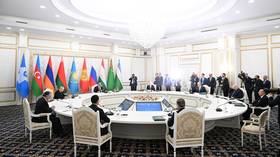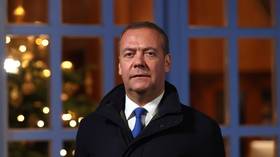Russia vows to fight ‘cancel culture’

Russia intends to fight foreign cultural expansion into the Commonwealth of Independent States (CIS), the Kremlin has said in a statement marking Moscow's assumption of the bloc's rotating one-year presidency.
Moscow intends to focus on enhancing the role of the CIS, which includes many post-Soviet republics, in the global arena. This includes deepening economic integration, tackling threats to member state security, as well as cooperation along other tracks, according to the Kremlin statement released on Monday.
When it comes to culture, “an important line of work will be resisting external destructive influence” on CIS members, the statement read, adding that such corrosive efforts could include “attempts to cancel the culture” of a particular people, or its contribution to global heritage.
To offset such potential influences, Russia as CIS chair will support “measures to counter the falsification of history and attempts to rehabilitate Nazism, and to preserve the historical memory of the Great Patriotic War, including the genocide of the Soviet peoples.”
The Soviet Union is estimated to have lost around 27 million lives during WWII. Approximately two-thirds of those deaths were civilians targeted by Nazi Germany's policy of deliberate extermination.
Moscow has repeatedly warned about a resurgence of Nazi ideology in the West and in Ukraine, while declaring that “denazification” is one of Russia’s key goals in the military operation against the neighboring state.
Russian President Vladimir Putin voiced outrage over an incident in September in the Canadian parliament which saw the country’s MPs giving a standing ovation to a Ukrainian Nazi collaborator and SS veteran, Yaroslav Hunka. After facing an international backlash, Canadian officials issued a public apology, and the then-parliament speaker Anthony Rota, who had invited the controversial figure, stepped down.
The Kremlin also noted that Moscow intends to continue cooperation with CIS members to “protect, support and promote Russian as an international language.” Other plans include enhancing military cooperation, boosting CIS members’ financial sovereignty by using national currencies in bilateral transactions, and partnerships in the energy sector.
Russia will also seek to “minimize the negative consequences caused by the use of unilateral coercive measures that violate international law” by various countries, the Kremlin said, in an apparent allusion to the unprecedented sanctions the West has imposed on Moscow over the Ukraine conflict.













